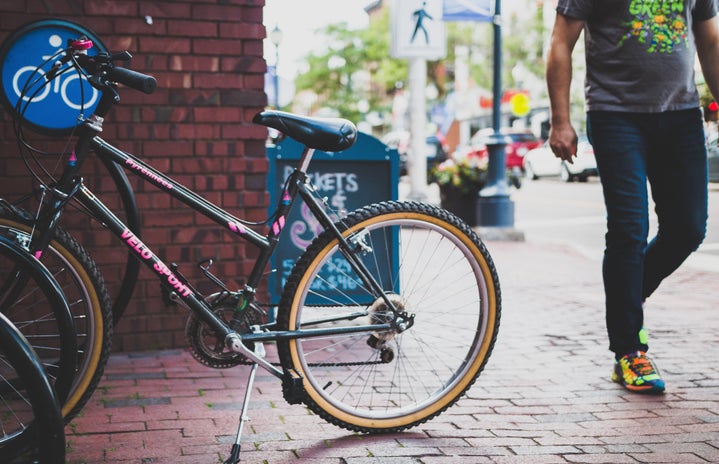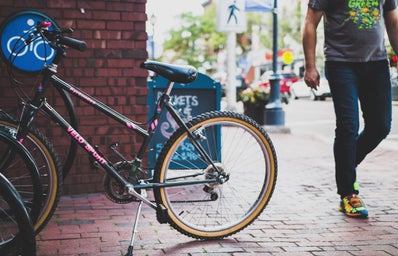Here’s a secret, one that has taken me years to admit: doors are damn heavy.
In high school, I lugged my heavy backpack everywhere, filled with no less than eight books and three binders at all times. I hunched from the weight, and I struggled to open doors, pulling as hard as I could and nearly falling backwards each time. My friends never seemed to need the same amount of effort to finish physical tasks, and I found myself frustrated that I did as if it were a personal failing.
I have chronic pain centered mainly in my shoulders, and on bad days, I can’t lift heavy objects, carry backpacks, raise my arms above my head, wear a ponytail, or even open doors without sending shocks along my arms. Even between flare-ups, it’s difficult to carry the same load that others easily can, and I worry when I try that I’ll aggravate my shoulders, creating more pain.
But, for a long time, I refused to admit this. I wanted to appear normal, not as the weak pain-girl I worried others would see. I carried bags far beyond what my shoulders could handle and grimaced my way through the pain it brought. I tightened my hair into ponytails when I went out with friends, thinking they looked more attractive. I opened doors for myself even when others offered, stubbornly yanking on the handles until my shoulders felt stiff and achy. I never asked for accommodations, as a rule, even when they would’ve helped.
When I entered college, I began to seek communities that normalized chronic illness, that recognized variations in bodies and ability levels. I made friends who talked with me about their own illnesses and, for the first time, allowed me to grapple with my experiences. I wrote about chronic pain for my English classes, then on my own. I started exploring avenues for beginning a student club for disability rights, bringing speakers and films to campus that show diverse experiences of disability, and increasing awareness about issues facing students with disabilities (a club that would eventually become IDREAM, founded with the support of my cool, encouraging friends!).
Even then, though, I struggled to ask for accommodations. I felt guilty for the tasks my body could not perform and for asking others to shift themselves around my inabilities. When I experienced week-long flare-ups that made me tired, grumpy, and unable to focus for long amounts of time, I still wrote my essays instead of asking for extensions. I still carried my backpack full of classwork and books across campus to the library instead of asking the people around me for help.
Over time, my friends began to notice how my body shifted when my shoulders hurt. They would ask if they could carry my backpack—offering instead of requiring me to speak—and would hold doors without saying anything at all. I started wearing my hair down even when we went to parties: even if I still think ponytails look more attractive, it isn’t worth the pain. I kept extra books in my dorm’s lounge and switched them out between classes, minimizing the weight of my bag.
This semester, I took a leap and applied for a library locker. This meant emailing Erin Salva from SASS, explaining my pain to her, waiting for her to legitimize my need for a locker, emailing the woman in the library who organizes the lockers, explaining my pain to her, finishing an application form, and waiting for the form to return, hopefully positively. I worried that I didn’t have “enough” reason for needing a locker, that the application would return denied and with it my pain would be dismissed in the way that I’d dismissed it for years. But it passed through the system easily, and I received my key the next day.
I started keeping notebooks and binders in the locker, and it was easy. So easy. My backpack began to feel so much lighter, a literal weight off my shoulders, and no longer did I struggle so much to simply carry books through campus. It didn’t make the pain disappear, but it made it easier to manage on a day-to-day basis. I began to wonder: what else did I need that I had denied myself?
I’m taking a film class in Gund Gallery right now, and I use the digital lab in Horvitz for assignments, both buildings with heavy doors that I have to spend ridiculous amounts of time attempting to open. I decided to try using the buttons that automatically open the doors, designed specifically for accessibility. It takes a bit longer for the doors to open—I stand awkwardly in front of them, waiting for them to slowly widen enough for me to fit through—but it doesn’t hurt. I feel less stressed each time I walk to them, knowing I don’t have to force my shoulders into pulling more weight than they can handle, knowing I won’t cause my pain levels to spike.
Still, though, I can’t unlearn the discomfort I feel about needing these accommodations. When I enter buildings behind other students, I try to slip through the doors before they close, without touching them or pushing the buttons at all. I allow others to hold doors open, escaping the problem entirely. When I do use the buttons and cause what seems like a traffic jam, making others wait for me, I feel guilty. I imagine their eyes running across me and my seemingly able body, thinking that I’m simply lazy, not that I’m trying to accommodate an invisible illness. The fear exists more in my own head than anything else—no one has ever said anything rude to me or otherwise invalidated my use of these buttons—but it still feels sharply real, and I worry.
But here’s another secret: I’m learning to worry less, and hopefully, to eventually stop worrying entirely with the help of supportive people and available accommodations. Knowing that resources like SASS and the library lockers exist helped me overcome the initial hurdle of asking for my first real, large accommodation (or what felt like it). Knowing that the buttons exist helped me become more comfortable using them, and knowing that my friends will carry my backpack, support the creation of more inclusive, disability-centric spaces on campus, and generally encourage me to ask for what I need helped me accept that I could and often should ask for help. This doesn’t change the fact that doors are so heavy in the first place—that the world is designed with able bodies in mind—nor does it change the fact that it took me so long to overcome my internalized fears about my illness because of perceived social stigma, but it is a path forward. Small acts help, and damn, I’m going to keep pressing the buttons.
Image Credits: 1, Courtney Felle

